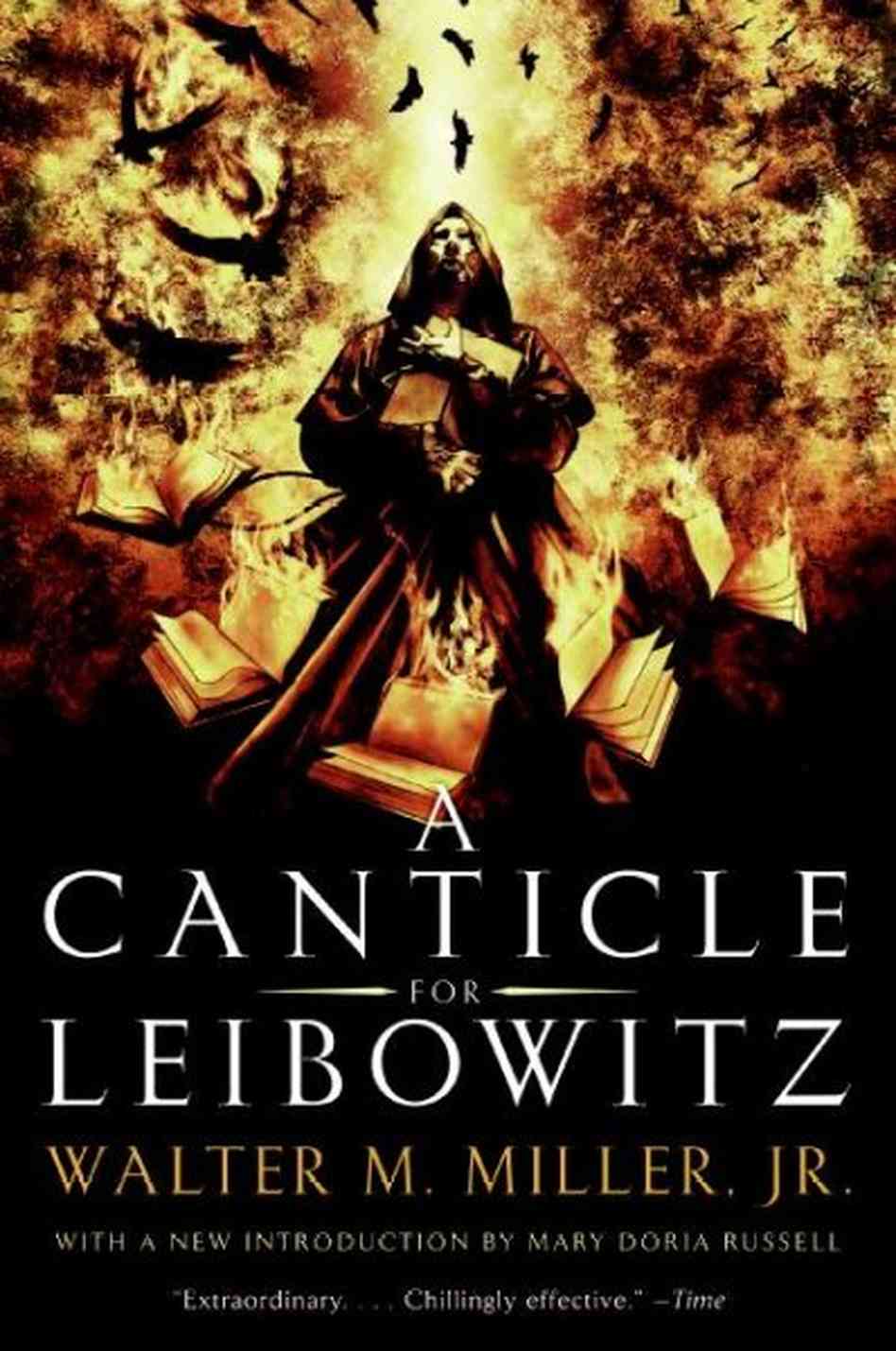Our book group choice for December 2003 is A Canticle for Leibowitz by Walter M. Miller Jr. Set in a Catholic monastery in the desert of the southwestern United States after a devastating nuclear war, the book spans thousands of years as civilization rebuilds itself. The monks of the Albertian Order of Leibowitz preserve the surviving remnants of man’s scientific knowledge until the world is again ready for it.
The novel is divided into three parts, each of which takes place in a different era:
- Fiat Homo (Latin for “Let there be man”): This part is set in the 26th century, about 1,000 years after the Flame Deluge. The world is a dark age, and knowledge of science and technology has been lost. The monks of the Albertian Order are the only ones who remember how to read and write, and they are dedicated to preserving the few remaining books and artifacts from the old world.
- Fiat Lux (Latin for “Let there be light”): This part is set in the 37th century. Civilization has begun to rebuild, but it is still a fragile thing. The monks of the Albertian Order are still custodians of knowledge, but they are now faced with the challenge of deciding how to share that knowledge with the world.
- Fiat Voluntas Tua (Latin for “Thy will be done”): This part is set in the 42nd century. The world has finally recovered from the Flame Deluge, and science and technology have once again flourished. However, the monks of the Albertian Order have become marginalized, and their knowledge is no longer seen as valuable.
A Canticle for Leibowitz is a complex and multifaceted novel that explores a wide range of themes, including the nature of knowledge, the role of religion in society, and the cyclical nature of history. The novel is also notable for its dark humor and its satirical take on human nature.
One of the central themes of A Canticle for Leibowitz is the relationship between knowledge and power. The monks of the Albertian Order are the keepers of knowledge, but they are also aware of the dangers of power. They know that knowledge can be used for good or evil, and they are determined to use it for the benefit of humanity.
Another important theme in the novel is the role of religion in society. The monks of the Albertian Order are devout Catholics, but they are also open-minded and tolerant of other faiths. They believe that religion can be a force for good in the world, but they also recognize that it can be used to justify violence and oppression.
Discussion Questions
- Who was Leibowitz and why was he made a saint?
- Who is the mysterious old man who appears in all three sections of Canticle? In what way does his story mirror the legend of the Wandering Jew? Why is he chosen to reappear; in other words, what is the old man’s role in this novel?
- In what ways does this book parallel the real history of the “dark ages,” the Renaissance era, and the development of modern technology? How closely do Miller’s fiction and real history track? Do you need knowledge of history to appreciate his book?
- Spend some time discussing one of the central themes in Canticle—the clash between religious faith and scientific rationalism? How does that conflict play out in this work? What is Miller’s stance on the issue? In what way is that theme still alive today?
- What does the phrase “Lucifer is fallen” signifiy in this novel?
- Discuss this passage: “The closer men came to perfecting for themselves a paradise, the more impatient they seemed to become with it and with themselves as well.” Is that observation true in real life?
- Philosopher George Santayana wrote in 1905, “Those who cannot remember the past are condemned to repeat it.” Miller probes that issue in Canticle. What conclusion does he reach? Is it inevitable that we will repeat our mistakes, or can we learn from the past? What are your views?
- As a pilot during World War II, Miller bombed the Benedictine Monastery at Monte Cassino. How might that fact color both his writing of this work…and your reading of it?
- In the final section of the book, Miller examines the role of faith in the face of suffering and destruction. He wrestles specifically with euthanasia and suicide. What are the opposing views that emerge from this discussion?
- Given the fact that Miller himself committed suicide years later, how does this affect your reading?
- Did you enjoy the religious and philosophical musings of Canticle…or did you find them distracting?
- This book is 40+ years old. What relevance does it hold for today? How did you come away from this book—feeling hopeless…or hopeful?

